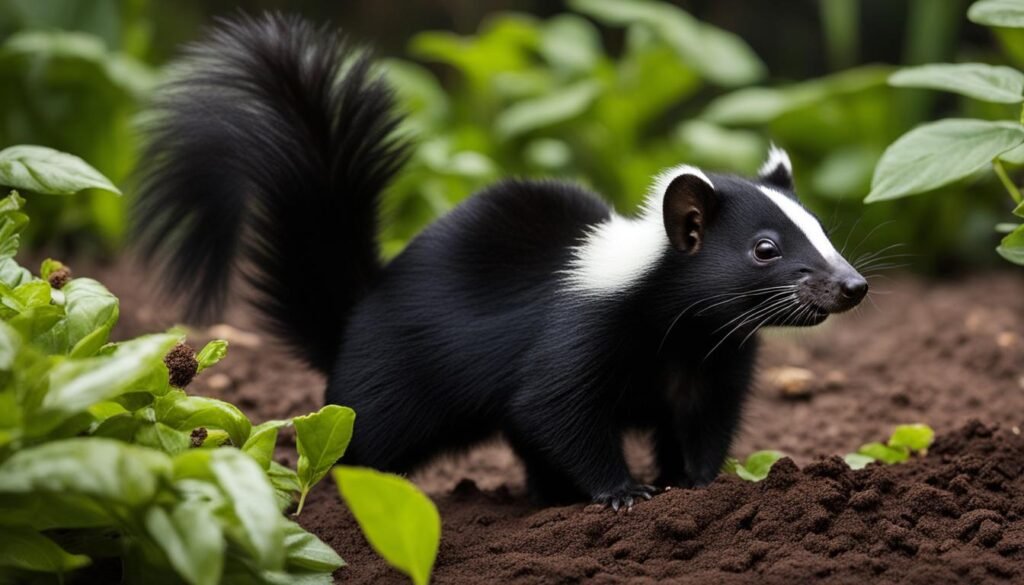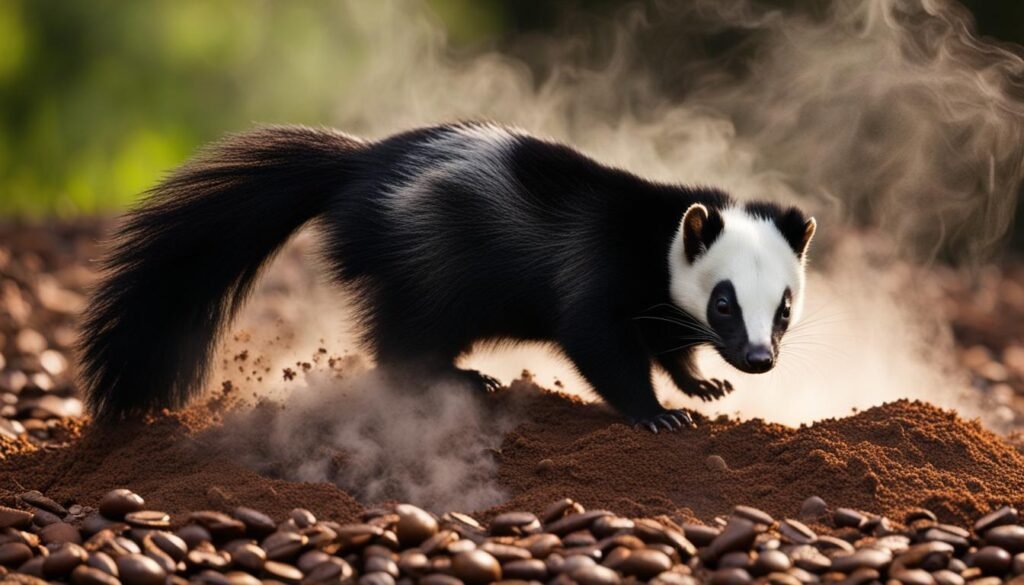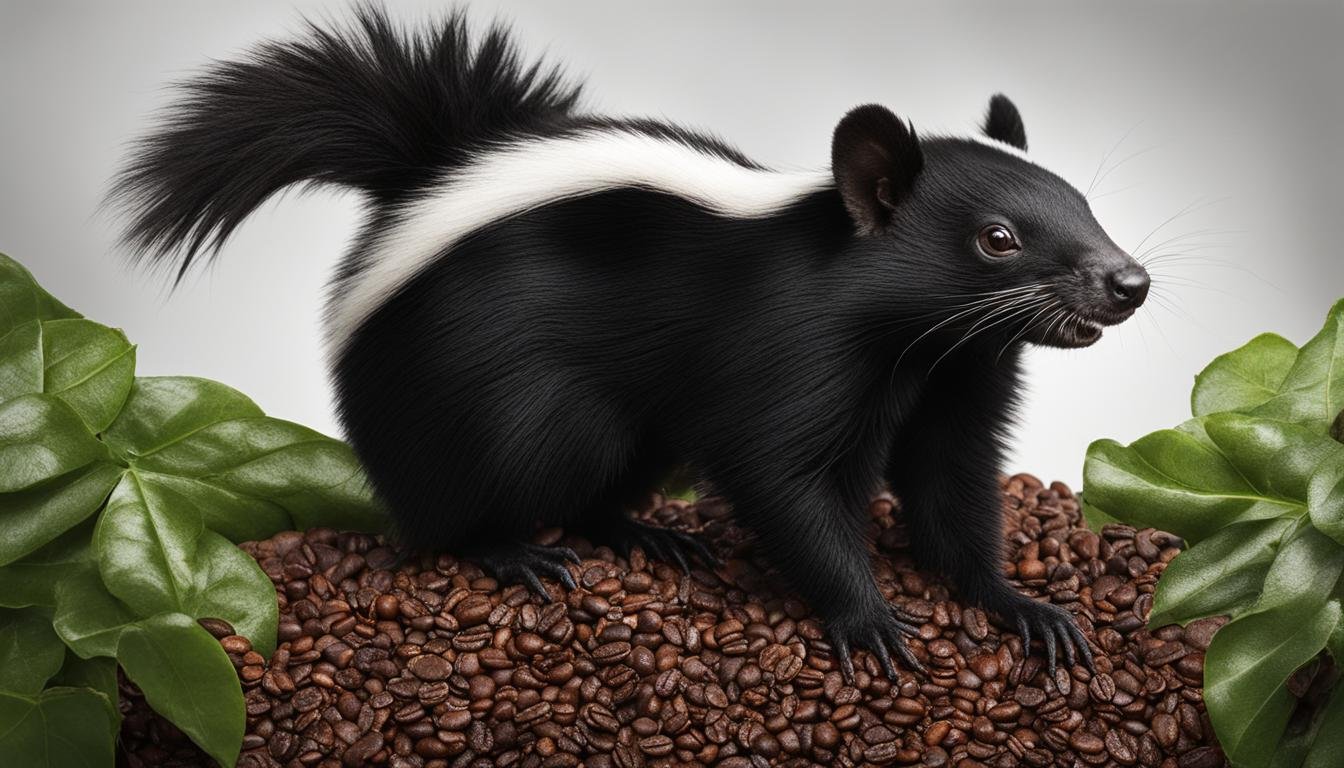Are you tired of dealing with pesky skunks invading your property? Look no further than your morning cup of joe! It turns out that coffee grounds can be an effective natural skunk deterrent. These grounds possess a bitter scent that skunks find incredibly off-putting, similar to ammonia or the urine of predators. By using coffee grounds, you can repel skunks and make them recognize the presence of humans, prompting them to seek out greener pastures. Whether you sprinkle the grounds directly onto the soil, around plant beds, or in skunk habitats, coffee grounds can keep these little stinkers at bay.
Coffee grounds offer more than just skunk repellent properties. They are also excellent for composting and can even be used as a fertilizer to promote healthy plant growth. By using coffee grounds, you not only deter skunks but also enrich your soil and create a thriving garden. Keep in mind that regular application may be necessary to maintain the effectiveness of coffee grounds, as skunks can eventually adapt to the scent. But don’t worry, we’ve got you covered with some handy tips and insights to maximize the power of coffee grounds as a natural skunk deterrent.
Key Takeaways:
- Coffee grounds can be an effective natural skunk deterrent due to their bitter scent.
- Skunks dislike the smell of coffee grounds, which resembles ammonia or predator urine.
- Regular application of coffee grounds may be necessary to maintain their effectiveness.
- Coffee grounds can be used for composting and as a fertilizer to promote plant growth.
- Combining coffee grounds with other skunk deterrent methods can enhance their effectiveness.
The Behavior and Habits of Skunks
Skunks are fascinating nocturnal rodents that exhibit unique behavior and habits. Understanding these characteristics can help us effectively deter them from our properties and minimize potential conflicts. Here are some key insights into skunk behavior:
Nocturnal Activity:
Skunks are primarily active during the night, making them nocturnal creatures. They emerge from their dens at dusk and return before dawn, using the cover of darkness to search for food and explore their surroundings.
Dietary Preferences:
Skunks have diverse dietary preferences and are considered opportunistic omnivores. Their diet includes a variety of foods such as leaves, shoots, berries, insects, larvae, and small animals like rodents. They are particularly attracted to easily accessible food sources, including nuts, garbage, grills, and lumber.
Attracted to Shelter:
Skunks seek refuge in areas with adequate shelter, such as dens, burrows, or hollow logs. They are excellent diggers and can create burrows beneath structures like decks, sheds, and crawl spaces. Skunks are also known to utilize abandoned dens made by other animals for their own protection.
By understanding the behavior and habits of skunks, we can implement effective deterrents and prevention methods to keep them away from our homes and gardens. In the following sections, we will explore the use of coffee grounds as a natural skunk deterrent, as well as other strategies for creating a skunk-free environment.
Using Coffee Grounds as a Skunk Deterrent

Coffee grounds can be a natural and effective solution to repel skunks from your property. Here are some ways to use coffee grounds as a skunk deterrent:
1. Sprinkle directly onto the soil
One method is to sprinkle used or fresh coffee grounds directly onto the soil or around plant beds that are at risk of skunk infestation. Skunks dislike the strong, bitter scent of coffee grounds, which resembles the smell of ammonia or a predator’s urine. By applying coffee grounds in these areas, you can deter skunks and reduce the chances of them infesting your yard.
2. Apply near skunk lairs or frequented areas
Another option is to sprinkle coffee grounds on skunk lairs or areas where they frequently visit, such as under large rocks or hollow logs. This can help prevent skunks from returning to those areas, making them less likely to cause damage or become a nuisance on your property.
3. Mix into the soil or use as compost
Coffee grounds can also be mixed into the soil or used as compost in planter beds to deter skunks from coming near your yard. Additionally, coffee grounds are rich in nutrients and minerals, making them a great natural fertilizer for plants. By incorporating coffee grounds into the soil, you can promote plant growth while keeping skunks away.
Remember to repeat the application of coffee grounds regularly, as the scent can fade over time. To preserve coffee grounds, store them in a clean plastic bag, zip bag, glass jar with a lid, or dry them in the sun before storing. Long-term use of coffee grounds as a skunk deterrent is safe for both humans and skunks, providing an eco-friendly alternative to chemical-based repellents.
The Effectiveness of Coffee Grounds in Repelling Skunks

Coffee grounds have been found to be effective in repelling skunks due to their bitter aroma. Skunks dislike the smell of coffee grounds, which resembles the scent of ammonia or a predator’s urine. The strong aroma of coffee grounds can deter skunks and make them fear the presence of humans, causing them to leave. However, over time, skunks may become accustomed to the scent of coffee grounds and realize that humans pose no harm to them. In such cases, the effectiveness of coffee grounds as a skunk repellent may diminish.
To maintain the effectiveness of coffee grounds in repelling skunks, it is recommended to regularly apply them in areas where skunks are likely to be present. This includes sprinkling coffee grounds directly onto the soil, around plant beds, or in skunk habitats. Combining the use of coffee grounds with other deterrent methods, such as motion sensor lights or predator urine, can also help increase their efficacy. It is important to note that while coffee grounds can be effective in repelling skunks, they should be used in conjunction with other skunk deterrents and prevention methods for optimal results.
Adaptability of Skunks
Skunks are known for their adaptability, and they can eventually become accustomed to the scent of coffee grounds. This means that regular application and combining coffee grounds with other deterrent methods are necessary to maintain their effectiveness. The adaptability of skunks highlights the importance of implementing a comprehensive approach to skunk deterrence, including habitat modification, eliminating food sources, and creating barriers.
Skunk Repellent
Coffee grounds can be considered a natural skunk repellent due to their ability to deter skunks with their strong aroma. The bitter scent of coffee grounds resembles the smell of ammonia or a predator’s urine, which can trigger a fear response in skunks and cause them to avoid the area. While coffee grounds may not provide a permanent solution, they can be a useful tool in managing and deterring skunks in your yard or garden.
Benefits of Using Coffee Grounds as a Skunk Deterrent

Using coffee grounds as a skunk deterrent not only helps to repel these pesky critters but also offers several benefits for your garden and the environment. Here are some of the key advantages:
Natural Fertilizer:
Coffee grounds are rich in nutrients, such as nitrogen, potassium, and phosphorus, which are essential for plant growth. When used as a soil amendment, coffee grounds act as a natural fertilizer, providing plants with the nourishment they need to thrive. This can lead to healthier, more robust plants in your garden.
Composting Aid:
Coffee grounds are a valuable addition to compost piles. They help to speed up the decomposition process and add organic matter to the mix. As coffee grounds break down, they release nutrients into the compost, enriching it and creating nutrient-rich humus that can be used to improve soil quality and promote healthy plant growth.
Natural Pest Control:
In addition to deterring skunks, coffee grounds can also help to repel other unwanted pests in your garden. Their strong aroma acts as a natural deterrent for insects such as slugs, snails, and ants. By spreading coffee grounds around susceptible areas, you can deter these pests and protect your plants without the need for chemical pesticides.
By using coffee grounds as a skunk deterrent, you not only keep skunks at bay but also contribute to the overall health and sustainability of your garden. Whether as a natural fertilizer, composting aid, or pest control measure, coffee grounds offer a safe and eco-friendly alternative for those looking to protect their plants from skunks and enhance the vitality of their garden.
Other Skunk Deterrents and Prevention Methods
While coffee grounds can be effective in repelling skunks, there are other skunk deterrents and prevention methods that can further enhance your efforts. Here are some additional strategies to consider:
- Habitat Modification: Skunks are attracted to areas with suitable shelter and food sources. By modifying the habitat, you can make your property less appealing to skunks. Seal off any potential entry points to sheds, decks, or crawl spaces to prevent skunks from taking up residence. Additionally, remove any debris or woodpiles that may create an attractive habitat for skunks.
- Fencing: Creating physical barriers using fences or walls can help keep skunks out of your property. Make sure the fence extends underground to prevent skunks from burrowing underneath. Opt for solid barriers rather than chain-link fences, as skunks can easily squeeze through small openings.
- Eliminating Food Sources: Skunks are opportunistic feeders and can be attracted to pet food, bird feeders, and easily accessible garbage cans. Securely store pet food indoors, clean up fallen birdseed regularly, and use tightly sealed garbage cans.
- Habitat Prevention: Take measures to eliminate skunk-friendly habitats in your yard. Keep the grass mowed short to discourage skunks from nesting. Trim overgrown shrubs or bushes, as they can provide hiding spots for skunks. By reducing potential shelter options, you can discourage skunks from taking up residence.
By implementing a combination of these skunk deterrents and prevention methods, you can increase the effectiveness of coffee grounds in repelling skunks. Remember to regularly apply coffee grounds and maintain other preventive measures for long-term success in keeping skunks away from your property.
Safe Handling and Storage of Coffee Grounds
When it comes to using coffee grounds as a skunk deterrent, it’s important to handle them safely and store them properly to maintain their effectiveness. Here are some tips:
Handling Coffee Grounds
- Wear gloves when applying coffee grounds to protect your hands.
- Avoid touching your face or eyes while handling coffee grounds.
- Wash your hands thoroughly after handling coffee grounds to remove any residue.
Storage Methods
To preserve the quality and freshness of coffee grounds for longer use, consider the following storage methods:
- Store coffee grounds in a clean plastic bag, zip bag, or glass jar with a lid to keep them airtight.
- Keep coffee grounds in a cool place with a stable temperature, away from direct sunlight or heat sources.
- If the weather is hot, store coffee grounds in the refrigerator to maintain their freshness.
Preserving Coffee Grounds
To ensure that coffee grounds remain effective as a skunk deterrent, it’s important to preserve their quality:
- Dry coffee grounds in the sun before storing them in a bag for longer use.
- Avoid storing coffee grounds for an extended period; it’s best to use them within a few months.
- If coffee grounds start to lose their scent, consider refreshing them by adding fresh grounds or using alternative deterrent methods.
By following these safe handling and storage practices, you can maximize the longevity and effectiveness of coffee grounds as a natural skunk deterrent.
Conclusion
In conclusion, we have found that coffee grounds can be a highly effective and natural solution for repelling skunks. Their bitter scent acts as a powerful deterrent, making skunks recognize the presence of humans and prompting them to leave. Not only do coffee grounds offer skunk-repellent properties, but they also provide additional benefits like fertilizing plants and improving soil quality.
While coffee grounds are a great option for repelling skunks, it’s important to consider other skunk deterrents and prevention methods to maximize effectiveness. By combining the use of coffee grounds with habitat modification, eliminating food sources, and creating barriers, you can create a skunk-free environment.
These natural solutions not only prove to be safe and eco-friendly but also offer a reliable alternative to chemical-based skunk repellents. So, if you’re looking for a natural and effective way to keep skunks at bay, coffee grounds are definitely worth a try!
FAQ
Do coffee grounds repel skunks?
Yes, coffee grounds can repel skunks due to their bitter scent, which skunks dislike. The aroma of coffee grounds is similar to ammonia or the urine of predators, making skunks recognize the presence of humans and causing them to leave.
What are the behavior and habits of skunks?
Skunks are nocturnal rodents that are primarily active from dusk to dawn. They are attracted to areas with potential food sources, such as nuts, garbage, grills, and lumber. Skunks eat a variety of foods, including leaves, shoots, berries, insects, larvae, and small animals like rodents. They have a strong sense of smell and are typically attracted to areas with accessible food and shelter.
How do I use coffee grounds as a skunk deterrent?
Coffee grounds can be sprinkled directly onto the soil, around plant beds, or in skunk habitats. They can also be mixed into the soil or used as compost to promote plant growth while keeping skunks away. Regular application may be necessary to maintain their effectiveness, as skunks can eventually adapt to the scent.
How effective are coffee grounds in repelling skunks?
Coffee grounds can be effective in repelling skunks, but their effectiveness may diminish over time as skunks become accustomed to the scent. Regular application and combining coffee grounds with other deterrent methods can help maintain their effectiveness.
What are the benefits of using coffee grounds as a skunk deterrent?
In addition to repelling skunks, coffee grounds are beneficial for composting and can be used as a fertilizer to promote plant growth. They offer a natural and environmentally friendly alternative to chemical-based skunk repellents, making them safe for both humans and the environment.
What are other skunk deterrents and prevention methods?
Other skunk deterrents and prevention methods include creating barriers using fences or walls, eliminating food sources, and removing or modifying skunk habitats. Implementing a combination of these methods can increase the effectiveness of coffee grounds in repelling skunks.
How should I handle and store coffee grounds as a skunk deterrent?
When applying coffee grounds, it is recommended to wear gloves to protect your hands. Coffee grounds can be stored in clean plastic bags, zip bags, or glass jars with lids. In normal weather conditions, they can be stored in a cool place, but in hot weather, storing them in the refrigerator can help maintain their freshness.
Are coffee grounds safe to use and handle?
Yes, coffee grounds are safe to handle and use as a skunk deterrent. They provide a natural and eco-friendly option for repelling skunks without harming humans or the environment.

Leave a Reply